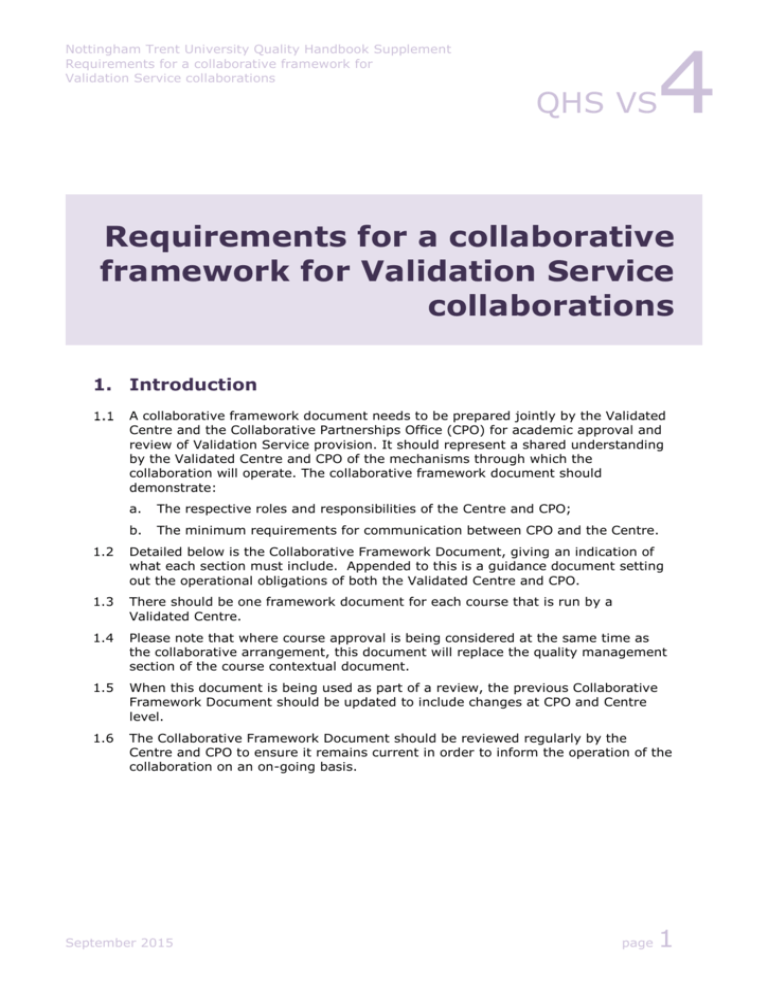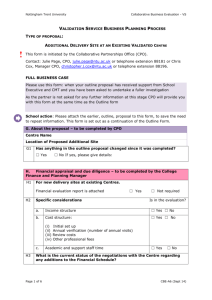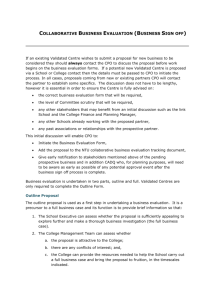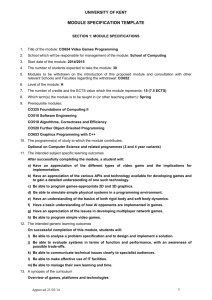Validation Service collaborations
advertisement

Nottingham Trent University Quality Handbook Supplement Requirements for a collaborative framework for Validation Service collaborations QHS VS 4 Requirements for a collaborative framework for Validation Service collaborations 1. Introduction A collaborative framework document needs to be prepared jointly by the Validated Centre and the Collaborative Partnerships Office (CPO) for academic approval and review of Validation Service provision. It should represent a shared understanding by the Validated Centre and CPO of the mechanisms through which the collaboration will operate. The collaborative framework document should demonstrate: a. The respective roles and responsibilities of the Centre and CPO; b. The minimum requirements for communication between CPO and the Centre. 1.2 Detailed below is the Collaborative Framework Document, giving an indication of what each section must include. Appended to this is a guidance document setting out the operational obligations of both the Validated Centre and CPO. 1.3 There should be one framework document for each course that is run by a Validated Centre. 1.4 Please note that where course approval is being considered at the same time as the collaborative arrangement, this document will replace the quality management section of the course contextual document. 1.5 When this document is being used as part of a review, the previous Collaborative Framework Document should be updated to include changes at CPO and Centre level. 1.6 The Collaborative Framework Document should be reviewed regularly by the Centre and CPO to ensure it remains current in order to inform the operation of the collaboration on an on-going basis. September 2015 page 1 Nottingham Trent University Quality Handbook Supplement Requirements for a collaborative framework for Validation Service collaborations QHS VS 4 2. Collaborative Framework Document Validated Centre Information (to be completed by the Centre) Centre name: Centre address: Centre telephone number and web address: Nature of Centre: i.e. Private Institution / State University / Further Education College, etc. Head of Centre: name, email address and telephone number: Course Information: to be completed by the Centre Final award and course title: Mode(s) of study: Normal duration of study: Language of delivery: Language of assessment: Site(s) of delivery: Academic year: start and end dates Number of cohorts commencing in each academic year and month that each starts: Operation of the course: roles and responsibilities Activity Date that registrations are required from the Centre for each cohort: Expected month(s) in which award or progression boards September 2015 Validated Centre N/A CPO Based on cohort start dates. Registrations should be received within 10 weeks of the course commencing. N/A page 2 Nottingham Trent University Quality Handbook Supplement Requirements for a collaborative framework for Validation Service collaborations QHS VS 4 will be held: N/A Expected award ceremony date / month: Proposed point at which conferment lists will be expected from the Centre: N/A NTU Link School: N/A NTU Verifier: N/A Based on board dates and award ceremonies. Conferment lists should be received within 2 weeks of the Board. Named person with responsibility for staff development: N/A Named person with responsibility for Institutional Agreement: Julie Page Named person with responsibility for financial schedule: To include NTU link School details College Finance and Planning Manager Julie Page for FECs Named person with responsibility for marketing and publicity: Julie Page Named person with responsibility for certificate design: Faye Martin Named person with responsibility for student registrations: Faye Martin Named person with responsibility for e-library or associate library access: Faye Martin Named person with responsibility for travel arrangements: James Parker Named person with responsibility for invoicing: Faye Martin for registrations and e-library Gillian Allen – Academic Office Julie Page for other Named person with September 2015 Julie Page page 3 Nottingham Trent University Quality Handbook Supplement Requirements for a collaborative framework for Validation Service collaborations QHS VS 4 responsibility for external examiners: Named person with responsibility for annual reporting: Julie Page Named person with responsibility for course modifications: Julie Page Named person with responsibility for exam boards: Julie Page – receiving dates Named person with responsibility for conferments: Faye Martin Named person with responsibility for certificates: Receiving Faye Martin – CPO Gillian Allen – Academic Office N/A Named person with responsibility for award ceremonies: Named person with responsibility for transcripts: Named person with responsibility for student verification requests: Oversight of production Production of: Monitoring of: Faye Martin Faye Martin The operation of Validation Service Collaborative Provision 1. Overview and definition of Validation Service 1.1 The aim of this document is to set out the pre and post validation processes and requirements by CPO, Centre for Academic Development and Quality (CADQ) and the Validation Panel. It also serves to inform potential validated centres of the September 2015 page 4 Nottingham Trent University Quality Handbook Supplement Requirements for a collaborative framework for Validation Service collaborations QHS VS 4 nature of the relationship at the earliest opportunity and identifies the responsibilities of NTU departments. The document provides potential new centres with an early indication of their responsibilities, which are later followed up by CPO with a detailed post validation induction to NTU requirements. 1.2 NTU has many collaborative partners, 13 of which have been awarded Validated Centre status, based in the UK, including local Further Education Colleges and overseas centres across 6 countries. 1.3 A Validated Centre is an institution which is approved to offer one or more specified awards and where the institution has developed quality assurance and supporting institutional systems to ensure the standard of the award on an annual basis. The University retains responsibility for the approval of modifications to existing courses, introduction of new courses and provides substantial input into the quality assurance processes underpinning the courses of study offered. 1.4 Validated Centres are only approved where NTU has broad confidence that the partner has sufficiently robust systems for quality management that incorporate the principles of UK HE. 1.5 Validated Centres offer their own courses to their own students. Students studying and successfully passing a validated course at one of our validated centres will be awarded a Nottingham Trent University certificate. 1.6 For more information on Validated Centres please visit the NTU website at the following link: www.ntu.ac.uk/cpo 1.7 The Validation Service (VS) team in CPO manages the on-going relationship with Validated Centres. The VS team works closely with the Centre and the University verifier (an NTU academic) applying robust procedures to ensure on-going quality and standards are monitored and maintained. The VS team regards the Validated Centres as external clients of the University and prides itself in providing a gold standard customer service to centres. 2. On-going contact with the Centre CPO manages the validation service arrangements and is the central point of contact for all validated centres. 2.2 Following approval of a new Validated Centre and/or validation of a course at an existing Validated Centre (VC), the Validation Service (VS) team within CPO will take responsibility of the on-going management of the relationship, the day to day liaison with the Centre and administrative support, for example student registrations, conferments, approval of marketing and publicity, nomination of external examiners, appointment of verifiers and so on. Full details are provided later on in this document. 2.3 CPO has vast experience in supporting Validated Centres and has established effective arrangements in order to support the collaboration. 2.4 The VS team will maintain constant communication with the VC on all matters related to the collaboration. September 2015 page 5 Nottingham Trent University Quality Handbook Supplement Requirements for a collaborative framework for Validation Service collaborations QHS VS 4 3. Operation of the course 3.1 The course belongs to the Validated Centre and is delivered and assessed by the Centre. NTU academic staff do not deliver any part of the course. It is not usual practice, under a standard Validation Service Agreement, for students to undertake any part of their studies at NTU as the courses will differ from those delivered at NTU. Students at Validated Centres wishing to study at NTU must apply through the usual channels. 4. Institutional Agreement 4.1 A standard Institutional Agreement (IA) has been developed in conjunction with Legal Services for all Validation Service arrangements. CPO is responsible for issuing the Agreement and getting the Agreement signed by both parties. 4.2 The IA will set out the contractual arrangements including financial matters, publicity, risk management, dispute management and termination. 4.3 A Schedule of Courses is appended to the IA which lists the courses in validation. This can be added to as new courses are approved within the period of the Agreement. 4.4 Usually, a new validated centre and courses will be approved for a period of 3 years and are subject to periodic reviews on a 3-year cycle. 5. Financial Schedule 5.1 The Financial Schedule (FS) is part of the Institutional Agreement and referred to as Schedule 2 in the Agreement. The Financial Schedule is a standard schedule which has been agreed between CPO, the Schools and Legal Services. The Financial Schedule is the responsibility of the School, and the registration fee and other financial negotiations fall to the School. Due to resource implications the Schools will consult with CPO and Legal Services in case of additions to the FS. The Financial Schedule for Further Education Colleges (FECs) is the responsibility of CPO and there are a standard set of fees that apply to all FECs. 5.2 Outline financial negotiations should be agreed at the business evaluation and sign off stage and schools should be in a position to finalise the financials prior to the validation event. 5.3 CPO will co-ordinate the signing of both the IA and FS with both parties. One signed copy of each will be retained by the Validated Centre and the original IA kept in CPO with a copy to the school and the original FS sent to the school with a copy kept in CPO. The FS is a working document which will be used by the VS team to generate all invoices relating to the VS provision. 6. Marketing and publicity 6.1 In accordance with the Institutional Agreements for Validated Centres, the University grants a non-exclusive licence to Validated Centres to use the University’s trade marks in the territory, for the term of the agreement for use solely in relation to marketing documentation and course materials, provided the September 2015 page 6 Nottingham Trent University Quality Handbook Supplement Requirements for a collaborative framework for Validation Service collaborations QHS VS 4 University has given its approval, in writing, before any use of the University’s trademarks. 6.2 Validated Centres are required to forward draft copies of marketing and publicity material, all print and electronic communications where the NTU name and logo are used, for example brochures, advertising, web etc., to the University for approval prior to publication. A copy of the NTU logo and guidelines for use is sent to all Validated Centres following successful validation. The NTU logo and name may be used in marketing and publicity prior to validation, subject to CPO’s agreement and approval. All documentation must clearly state ‘subject to approval’. 6.3 The first point of contact for approval is Julie Page in CPO at email address julie.page@ntu.ac.uk 6.4 The approval process is as follows: 6.5 Submission of materials for approval with the Approval form, Section A to be completed by the Validated Centre – this is sent to Centres by CPO Visual and editorial check (where appropriate, English translations to be provided) Completion of Approval form for quality audit purposes (Section B by CPO) Sign off by Collaborative Partnerships Manager (CPO) Confirmation of approval by email Submission of final print materials for file CPO will endeavour to meet stated deadlines for publication. 7. Student registrations 7.1 Students at Validated Centres are not NTU students, they are students of the VC. The Centre is responsible for enrolling students onto their own student record system and in addition submit a student registration list to Faye Martin (faye.martin@ntu.ac.uk) on an Excel spread sheet within 10 weeks of the commencement of the course(s). This is required for each level of the courses(s). Only limited student details are required and the VS team will guide Centres on the information needed. The VS team will register the students onto the NTU student records system (Banner) and will be responsible at NTU for the upkeep of all VS student records. The full student record, including module marks will be kept by the Centre and not recorded on NTU’s system. 7.2 The VS team are responsible for building a new Banner code for each validated course. 8. Transcripts 8.1 Transcripts are not provided by the University but are the responsibility of the Centre. Centres should however ensure that transcripts state the language of teaching and assessment, if other than English, and the name of the Centre where the course was delivered. Centres are required to adhere to a minimum set of September 2015 page 7 Nottingham Trent University Quality Handbook Supplement Requirements for a collaborative framework for Validation Service collaborations QHS VS 4 criteria set out for transcripts, this criteria is approved by the Validation Service Sub Committee. Transcripts are monitored on an annual basis via the Centre Standard and Quality Report (CSQR). A copy of the transcript issued by the Centre should be sent to Faye Martin (faye.martin@ntu.ac.uk) in CPO for approval, to ensure it meets the Quality Assurance Agency for Higher Education (QAA) requirements. 9. E-Library 9.1 NTU offer an e-Library service for courses validated at VCs. There is currently one package available to centres, which focuses on business journals and includes access to Business Source Complete databases. There is an additional charge for this and details can be found in the Financial Schedule. 9.2 Please note, this package cannot be made available to individual students, but can be offered to specified courses within a validation service agreement. 9.3 For centres interested in the package please contact Faye Martin at faye.martin@ntu.ac.uk. 10. Walk-in access – associate readership 10.1 For Validated Centres local to Nottingham, NTU can offer walk-in access to its libraries both in the City and at the Clifton site. This package is similar to the membership that is available to the general public, but can be offered to Validated Centres at a much reduced rate. Details of the cost can be found in the Financial Schedule. 11. NOW and electronic resources 11.1 Students at Validated Centres are not entitled to access the NTU Online Workspace (NOW) or any other electronic resources (other than the e-Library package mentioned above). 12. Invoicing 12.1 On receipt of the registrations, CPO will issue an invoice in accordance with the Financial Schedule (see School’s responsibility). CPO are responsible for raising all invoices connected with Validation Service arrangement, including charges for validation and review events and University visits. A named contact, to whom invoices should be sent, should be made available to CPO. 13. Certificates 13.1 The parchments that are produced for students at Validated Centres are largely the same as the certificates awarded to NTU students, with a number of additions: September 2015 The name of the Validated Centre must appear on the certificate; The language of instruction (if not English) must appear on the certificate; page 8 Nottingham Trent University Quality Handbook Supplement Requirements for a collaborative framework for Validation Service collaborations QHS VS 4 The location of the Validated Centre (if other than the UK) must appear on the certificate; Validated Centres also have the option to have their own logo printed on the certificate, along with the Director’s (or equivalent) name, title and signature. In some contexts it may be inappropriate for the location and language of study to be included on the certificate, in such cases the transcript will contain this information and the certificate will refer to the existence of the transcript. 13.2 If Centres wish their certificates to include the Director’s signature, and/or centre logo, they should forward the necessary files to Julie Page as an email attachment, or on a disk, who in turn will liaise with the Academic Office. 13.3 CPO (Julie Page) will notify Academic Office of all newly approved Validated Centres and the approval of additional courses at existing Validated Centres. 14. Conferments 14.1 The conferment list should be completed and returned to Faye Martin, within 2 weeks of the Examination Board (at which students are conferred). 14.2 The conferment list has to be fully completed and signed before the Academic Office can produce the certificates. 14.3 If Centres are planning an Awards Ceremony or have a deadline for the certificates to be received, they should notify Faye Martin. Conferment lists should be received at least 6 weeks before this deadline. 15. Awards ceremony 15.1 Students at Validated Centres are not NTU students and therefore not invited to the NTU awards ceremonies. Centres may hold their own ceremonies locally. They may also invite a member of NTU staff to represent the University if they wish. Costs for this are normally covered by the Centre. Centres will be asked to provide the dates of their awards ceremonies so that CPO can ensure Academic Office have sufficient time to produce and despatch the certificates. 16. Website 16.1 CPO is an independent department (separate to CADQ) and has its own website – www.ntu.ac.uk/cpo. The information held for each partner includes the period of the Agreement, when a review is due, a list of courses approved under the validation service and a small section of background information on the Centre, with a link to their website. 17. External examiners All External examiner appointments to courses leading to an award of the University are nominated by the Validated Centres but must be approved by the September 2015 page 9 Nottingham Trent University Quality Handbook Supplement Requirements for a collaborative framework for Validation Service collaborations QHS VS 4 University’s Academic Standards and Quality Committee (ASQC). External examiners are contracted to the Validated Centre who are responsible for agreeing a schedule of work and paying the external examiner fees and expenses. 17.2 With effect from appointments expiring on 31 December 2016, replacement external examiners will be contracted to NTU. Validated Centres will continue to identify the potential external examiner. Nominations 17.3 All nominations must be approved by the University. The University nominations forms (EE4 new nominations, EE2 and EE3 additional duties and extensions) must be completed by the Validated Centre and submitted to Julie Page, who is responsible for guiding them through this process. 17.4 Nominations are received by Julie Page. The nominations are then forwarded to Jane Dyer in CADQ, who prepares a cover sheet for the external examiner Appointment’s Panel (EEAP) and sends the nomination to the verifier for comments. If a verifier is not in place at the time of submission, comments on the suitability of candidates will be sought from the Dean of School, or nominated representative. Nominations for external examiners at Validated Centres are considered for approval by the EEAP. 17.5 The VS team will liaise with the Centre when an existing external examiner is coming to the end of their period of tenure to remind them to start searching for a replacement, usually a minimum of about 18 months beforehand. Confirming the appointment 17.6 Formal notification is sent in writing by Julie Page to the external examiner and the Validated Centre, and copied to the verifier when the appointment is fully approved. Induction 17.7 For all replacement appointments from September 2016 onwards, it will be NTU’s responsibility to induct the external examiner and to ensure that they are fully briefed and aware of their roles and responsibilities. The external examiner is invited to the University’s induction course. The Centre will retain the responsibility for induction at course level and will be done at the Centre. 17.8 Part of the University verifier’s remit is to check that the external examiner has received the induction at course level by the Centre and that they are fully aware of the University’s reporting requirements and systems. Reports 17.9 External examiners are required to submit their reports online directly to the University. The VS team provide full details and guidance to the external examiner on how to do this. The EE report is received by the University and read by the VS team. The report is forwarded to the Centre within one working day of receipt. 17.10 If any serious issues are highlighted in the report, the Centre will be asked to respond immediately and the report will be submitted to the next Validation Service Sub-committee. Otherwise external examiner’s comments should be addressed in the CSQR. September 2015 page 10 Nottingham Trent University Quality Handbook Supplement Requirements for a collaborative framework for Validation Service collaborations QHS VS 4 18. University Verifier 18.1 A University verifier will be appointed by the link School and in liaison with CPO, for all validated courses at Validated Centres. CPO will contact the School after the validation event to set the ball rolling. The verifier, usually an NTU academic subject specialist, is required to check that the validated courses are being delivered as specified in the definitive document and as agreed under the terms of validation, and that the academic standard of the work is commensurate with the award. 18.2 CPO will induct the verifier into the role on a one to one basis and will provide the verifier with all the necessary documentation, including definitive course documents, the Verifier Handbook, and background information on the Centre. 18.3 The verifier is required to visit the Validated Centre at least once a year, usually (but not necessarily) at the time of Examination Boards. It should be noted however that when a partnership is in its infancy, and certainly for the first 3 years, the verifier is required to attend the Exam Board to ensure it is operating effectively. CPO will ensure the School is aware of the time of year the verifier is likely to be undertaking his / her visit as this may impact on School resources during key times. Verifiers are typically in appointment for a period of 3-4 years. 18.4 Liaison with the Centre should be via CPO who will pass on Exam Board dates and any other information needed by the verifier. In the case of FECs it is usually easier for the verifiers to liaise directly with the course leaders to arrange a preliminary visit – in these cases CPO should be copied into all correspondence. 18.5 The verifier is required to submit a report to CPO within 4 weeks of the visit or attendance at the Board, which is read in CPO and forwarded to the Validated Centre. If any serious issues have been highlighted we will ask the Centre to respond immediately and the report will be submitted to the next Validation Service Sub Committee. Report templates are provided by CPO and can also be found on the CPO website. For courses in “teach-out” verifiers are required to complete a specific “teach-out report” template. 18.6 A brief outline of the verifier’s duties is summarised below: Visit the centre at least once a year; Submit a report to CPO, per course, following each visit; Read and comment (written and by attendance at the Validation Service Sub-committee (VSSC)) on the Centres’ annual course report (CSQR) and centre report (VCSQR (if appropriate)); Comment on the suitability of external examiner nominations; Comment on any proposed changes to existing courses; Attend the Verifier’s Annual Meeting; Be a member of the review panel at the end of his/her tenure. 18.7 More details on the role of the verifier can be provided if required – please contact Julie Page in CPO. 18.8 CPO undertakes all of the necessary travel arrangements with regards to the Verifier's visit. September 2015 page 11 Nottingham Trent University Quality Handbook Supplement Requirements for a collaborative framework for Validation Service collaborations QHS VS 4 19. Course Standards and Quality Report 19.1 Validated Centres are required to submit an annual report for each validated course, which is considered by VSSC. The CSQR(s) should be submitted to Julie Page. Centres will be notified of the VSSC date when their CSQRs/VCSQR will be considered and the deadline date for submission. 19.2 The verifier is required to read the report and provide written comments for VSSC and to attend the VSSC meeting when the report is being considered if possible. The verifier report and the external examiner(s) reports will be submitted to the VSSC along with the CSQR for full consideration. 19.3 Following the VSSC meeting, feedback on the CSQR will be sent to Centres by CPO in the form of the formal minute note and the CADQ commentary. Centres may be asked for a response on particular issues in which case a deadline date will be given. The Centres’ response will be fed back to VSSC and tracked by Julie Page in CPO until the process is complete. 19.4 Centres are provided with a template and guidance on writing CSQRs. CADQ are also happy to offer staff development on an individual Validated Centre basis – please contact Julie Page in CPO for more information. 19.5 For courses in teach out centres are required to complete a specific teach out CSQR template. 20. Validated Centre Standards and Quality Reports 20.1 A Validated Centre Standards and Quality Report is required by centres who offer more than two / three NTU validated courses, and at CPO / CADQ’s discretion. 20.2 A VCSQR should bring together matters for consideration at institutional level and should cut down on repetition in CSQRs. 20.3 VCSQRs are subject to the same process of consideration as CSQRs. 21. Modifications to Existing Courses 21.1 Where changes to existing validated courses are required, for example in response to annual review, external examiner or Verifier feedback, these changes must be approved by the University prior to implementation. 21.2 Current information about changes to courses and the procedure to follow can be found in Section 5 of the NTU Quality Handbook. 21.3 Centres should contact Julie Page in CPO in the first instance who will guide Centres through the completion of the ‘Reporting Proposed Changes to Courses’ form and advise Centres who the CADQ liaison officer will be for processing the proposal, usually through VSSC, through to approval. 22. Additional Delivery Sites 22.1 Courses are normally approved for delivery at one location within a Centre. September 2015 page 12 Nottingham Trent University Quality Handbook Supplement Requirements for a collaborative framework for Validation Service collaborations QHS VS 4 22.2 If Centres have multiple locations then each location is subject to separate approval and on a course by course basis. 22.3 In some instances the University Verifier or other member of the University, representing the Academic Standards and Quality Committee, will undertake a visit to a proposed delivery centre in order to consider whether that centre is in an appropriate location and has appropriate resources for the delivery of the University’s courses. 22.4 The checklist is intended to facilitate the University’s member of staff and is completed by the University (not the Validated Centre). 22.5 In other cases it may be necessary for a panel to visit a proposed new delivery centre. 22.6 The outcomes of the visit, completed delivery site checklist and supporting documentation provided by the centre will ultimately be submitted to the VSSC for consideration of approval. 22.7 Please contact Julie Page in CPO in the first instance – the same process as ‘Reporting Changes’ is followed. It is most likely that business evaluation should be completed prior to the academic approval as there will financial implications if the verifier is required to visit a different campus. 22.8 The University will not support the Centre approving a further provider: serial franchising or sub-contracting is not allowable. September 2015 page 13







